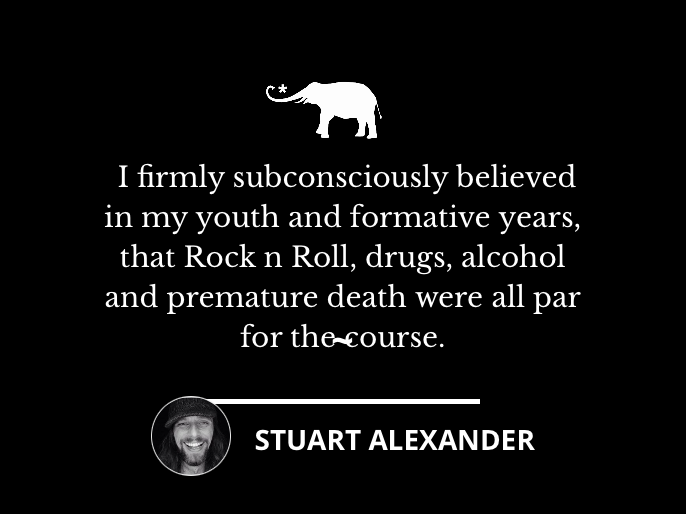I have been a professional musician off and on for over 30 years, this was up until recently when I was diagnosed with Bipolar. Over the years I and other musicians I know have had awful issues with both mental illness and substance abuse. The well accepted trope is that all musicians abuse and use drugs. But why is this so?
From the very first gigs I booked I was often offered alcohol as part payment for gigs and later on given large riders of booze at gigs. This is where the problem begins I feel. No other industry or job in the world would feel it appropriate to pay employees in drugs, seeing as alcohol is one of the most widespread and insidious drugs of them all.
Its shocking to think that my 18 year old self was paid in a drug I ultimately became hopelessly addicted to by my mid-twenties. The pressure of live performance, travel and the uncertainty associated with a music career leaves individuals wide open to abusing alcohol and in turn becoming addicted. The normalisation of being drunk while performing added to the freely available nature of alcohol and other substances in the musical world is toxic and dangerous.
Why music and drug or alcohol abuse is so prevalent is baffling in a career where focus and performance is key. It seems shocking that promoters, managers and agents either turn a blind eye to substance abuse or actively encourage it oftentimes.
Why does the public accept elegantly wasted performances and then the less elegant sink to the bottom associated with alcohol and drug abuse? No other job I can think of would people accept an individual loading up on cocaine and alcohol to perform their job.
It is well documented how many famous artists have met their end via drug and alcohol addiction or overdose, but still the trope persists. Artists like Amy Winehouse who publicly destroyed herself, all while the audience clapped and cheered. Gratuitously watching as their hero or heroine died every night, every interview in front of their very eyes. When I was younger I watched as me and many friends romanticised the death of Kurt Cobain by suicide brought on by heroin addiction or revelled in the self destruction of the other original 27 club members – Jim Morrison, Jimi Hendrix, Brian Jones and Janis Joplin.
All of the aforementioned had obvious and well publicised addictions that played out on stage and in the public arena. These glamorous ‘role models’ either inhaled and suffocated on vomit or suffered heart failure, not very romantic, but ever so Rock n Roll!
This is all summons an inquiry into what these publicly played out and romanticised deaths do to the sensitive and easily influenced psyche of young fans. I can only speak for myself and I firmly subconsciously believed in my youth and formative years, that Rock n Roll, drugs, alcohol and premature death were all par for the course.
How disturbing I feel it is now that I happily ignored the misery behind a chronic alcoholic or drug addict. I soon found out the hard way, when in my 20’s, I developed a near terminal addiction to alcohol and prescription Valium. As I lay on a floor throwing up and sweating I didn’t feel romantic or Rock n Roll, I felt scared and hopeless.
The many drug and booze rehabilitation stories don’t help either I feel. It tells young and easily influenced individuals that it’s a path they must tread. As if becoming an addict is part and parcel of becoming famous or successful. It is baffling how an addiction, even if conquered, can become an accolade or dare i say it, an achievement.
I have always batted away the ‘well done on giving up’ comment. I don’t feel I achieved anything by developing an all consuming addiction, nearly dying and then giving up. I think this trope of having inherent strength and giving up is dangerous. I didn’t have inner strength, I was weak at that point and not in possession of any willpower and that is why I became hopelessly addicted and for a long time unable to give up.
The way I finally managed to give up is through the support of my family and medical professionals. At the point I accessed help I had nothing left to give and had to succumb, weakly, to an intervention. The choices at this point were not mine but the choices of those around me and a dedicated rehabilitation team at a hospital.
I am not saying that I didn’t have to muster some strength. I’m saying that I had no choice, I had hit the proverbial rock bottom and had nowhere left to run. I think the narrative around addiction and Rock n Roll fuels more addiction. For me at least these ideas helped push me on into hopeless addiction and fuel my nihilism.
My point is that whilst we romanticise and celebrate addiction as part and parcel of a music career, all the while fuelling it with gigs paid in booze and a blind eye turned to drug abuse we are going to keep seeing the same tired, sad cycle play out for people in music both professionally or otherwise. We owe it to young easily influenced fans and aspiring musicians that there is nothing romantic, Rock n Roll or required about developing an all encompassing addiction to drugs or alcohol and inhaling your own vomit after a drug or alcohol binge.












Read 0 comments and reply